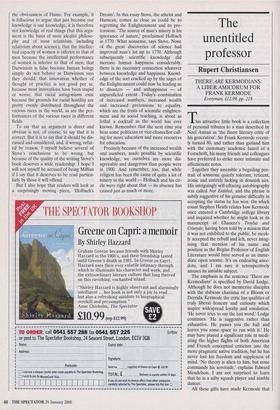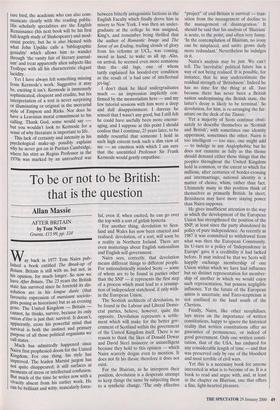The unentitled professor
Rupert Christiansen
THERE ARE KERMODIANS: A LIBER AMICORUM FOR FRANK KERMODE Evefryman, £12.99, pp. 218 his attractive little book is a collection of personal tributes to a man described by Noel Annan as `the finest literary critic of his generation'. Sir Frank Kerrnode recent- ly turned 80, and rather than garland him with the customary academic laurel of a Festschrift, his many friends and colleagues have preferred to strike more intimate and affectionate notes.
Together they assemble a beguiling por- trait of someone quietly tolerant, reticent, ironic and entirely lacking in donnish airs. His intriguingly self-effacing autobiography was called Not Entitled, and the phrase is subtly suggestive of his genuine difficulty in accepting the status he has won. On which count Stephen Heath relates how Kermode once entered a Cambridge college library and inquired whether he might look at its manuscript of Chaucer's Troylus and Criseyde; having been told by a minion that it was not exhibited to the public, he meek- ly accepted the rebuff and left, never imag- ining that mention of his name and position as the Regius Professor of English Literature would have served as an imme- diate open sesame. It's an endearing anec- dote, and I am sure it retrospectively amuses its amiable subject.
The emphasis in the sentence `There are Kermodians' is specified by David Lodge. Although he does not mesmerise disciples with the dubious charisma of a Bloom or Derrida, Kermode the critic has qualities of truly liberal honesty and curiosity which inspire widespread loyalty and emulation. 'He never tries to say the last word,' Lodge continues. `He is suggestive rather than exhaustive. He passes you the ball and leaves you some space to run with it.' He may have played a significant role in medi- ating the higher flights of both American and French conceptual criticism into the more pragmatic native tradition, but he has never lost his freedom and suppleness of mind. `No theory is alien to him, but none commands his servitude,' explains Edward Mendelson. I am not surprised to learn that he is a nifty squash player and nimble dancer.
All these gifts have made Kermode that rare bird, the academic who can also com- municate clearly with the reading public. His scholarly specialities are the English Renaissance (his next book will be his first full-length study of Shakespeare) and mod- ernist poetry, but he is also blessed with what John Updike calls a 'bibliographic geniality' which allows him to wander through 'the vanity fair of literary journal- ism' and treat apparently alien subjects like Trollope with all his characteristic elegant lucidity. Yet I have always felt something missing from Kermode's work. Suggestive it may be, exciting it isn't. Kermode is immensely sophisticated, eloquent and erudite, but his interpretation of a text is never surprising or illuminating or original in the mercurial style of Empson and Ricks. Nor does he have a Leavisian moral commitment to his calling. Thank God, some would say — but you wouldn't look to Kermode for a sense of why literature is important to life.. This lack of certainty and intensity in his psychological make-up possibly explains why he never got on in Puritan Cambridge, where his stint as Regius Professor in the 1970s was marked by an unresolved war between bitterly antagonistic factions in the English Faculty which finally drove him in misery to New York. I was then an under- graduate at the college he was assigned, King's, and remember being thrilled that the author of Romantic Image and The Sense of an Ending, trailing clouds of glory from his reforms at UCL, was coming, sword in hand, to wake us all up. Alas, on arrival, he seemed even more comatose than the old lags, one of whom tartly explained his hooded-eye condition as the result of 'a bad case of intellectual jet-lag'.
I don't think he liked undergraduates much — an impression implicitly con- firmed by the memorialists here — and my few tutorial sessions with him were a deep and dull disappointment. I daresay he sensed that I wasn't any good, but I still felt he could have usefully been more encour- aging, and I suppose at this point I should confess that I continue, 25 years later, to be mildly resentful that someone I hold in such high esteem took such a dim view of me — an emotion with which I am sure that the unentitled Professor Sir Frank Kermode would gently empathise.



















































































 Previous page
Previous page